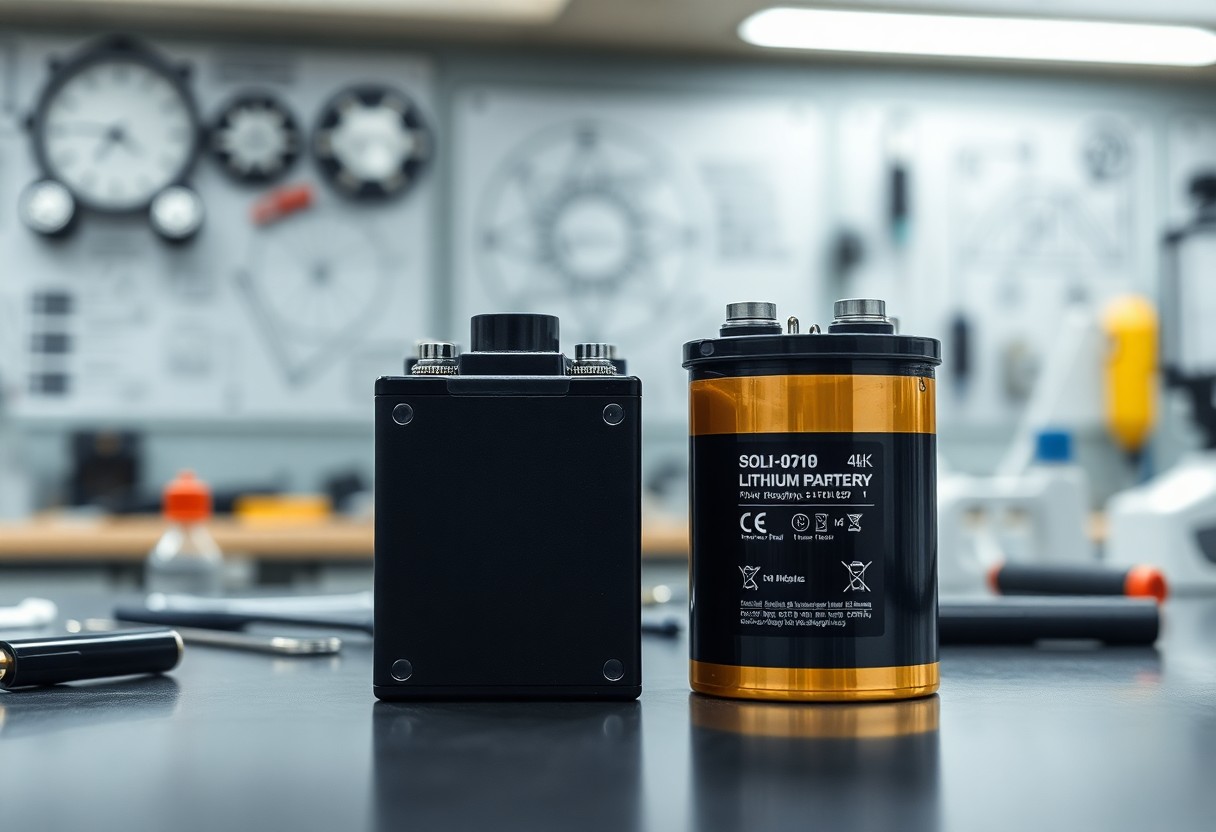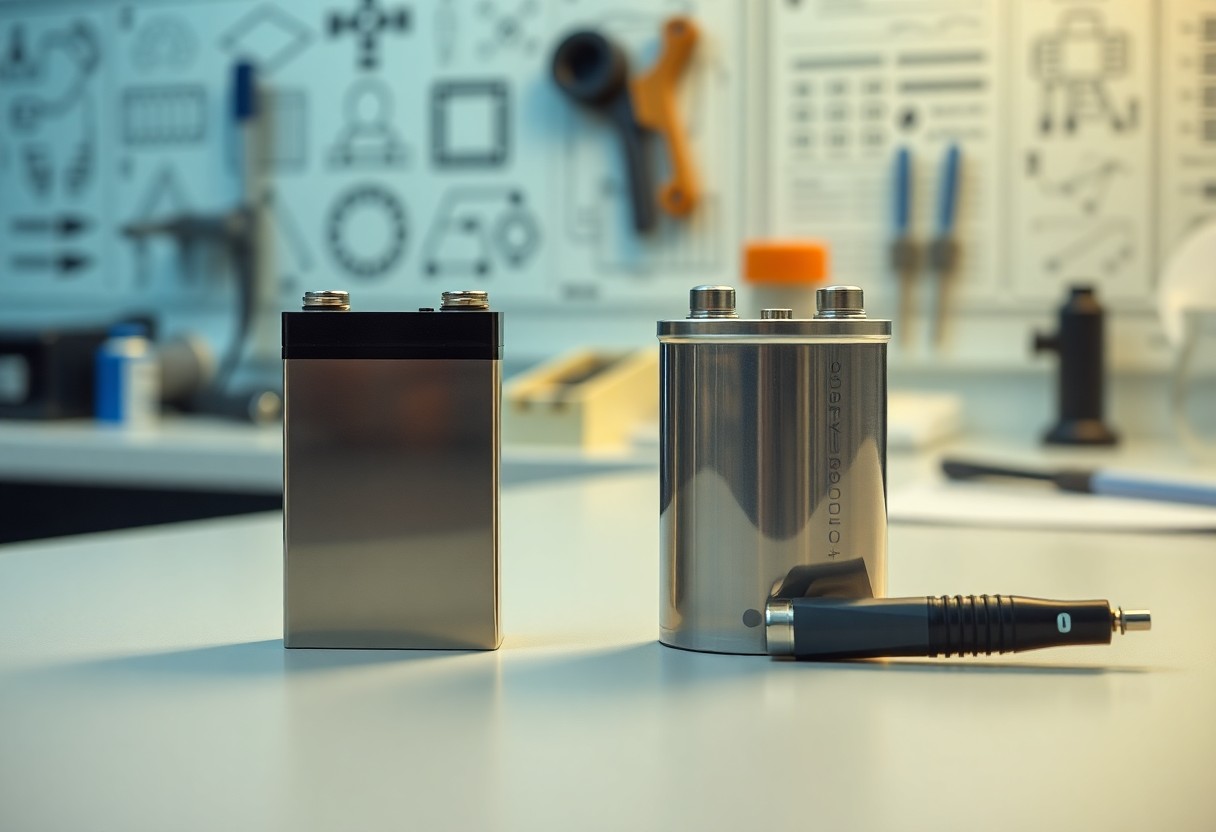Benefits of solid-state batteries include enhanced energy density, improved safety, and longer lifespan compared to traditional lithium-ion batteries. As you explore the shifting landscape of energy storage technology, understanding these advantages can help you make informed decisions for your devices and projects. Solid-state batteries not only promise to power your gadgets more efficiently, but they also contribute to a more sustainable future. In this post, we will examine into the key benefits, setting the stage for a transition that could redefine your energy experiences.
Understanding Solid-State Batteries
The world of batteries is evolving, and solid-state batteries are at the forefront of this innovation. They promise higher energy density and safety compared to traditional lithium-ion batteries. For a deeper explore this technology and its implications for electric vehicles, consider Navigating the Future: A Guide to Solid State Batteries …
Definition and Composition
To grasp the essence of solid-state batteries, you should know that they utilize a solid electrolyte instead of the liquid or gel electrolytes found in conventional lithium-ion batteries. This key difference enhances their stability and energy capacity, making them a promising alternative for various applications.
How They Differ from Lithium-Ion Batteries
They stand apart from lithium-ion batteries in several significant ways, including their materials, safety features, and performance capabilities. Solid-state designs replace the liquid electrolyte common in lithium-ion batteries with a solid electrolyte, which greatly reduces the risk of leakage or combustion.
Understanding these differences is vital for assessing the future of battery technologies. With solid-state batteries, you benefit from increased safety and higher performance, resulting in longer life cycles and faster charging times. The solid electrolyte minimizes risks such as dendrite formation, which can lead to short circuits in lithium-ion batteries. This makes solid-state batteries not only more efficient but also considerably safer for your devices and vehicles.
Advantages of Solid-State Batteries
While traditional lithium-ion batteries have served us well, solid-state batteries present numerous advantages that can transform energy storage. Their design can improve safety and efficiency, making them a promising alternative in various applications. If you want to learn more about what makes these batteries unique and their importance, check out What are solid-state batteries and why do we need them?.
Increased Energy Density
Among the most appealing features of solid-state batteries is their increased energy density, which allows for more energy to be stored in a smaller size. This means you can enjoy longer-lasting power without significantly increasing the weight or volume of the device you are using.
Enhanced Safety Features
Against the backdrop of safety concerns, solid-state batteries utilize solid electrolytes rather than flammable liquids, significantly reducing fire risk. This innovative approach not only enhances safety but also improves the overall reliability of electrical devices, so you can feel more confident in your power sources.
Also, the solid electrolytes are less prone to leakage and degradation, which further safeguards both the performance and longevity of your battery. This reliability is particularly important for applications in electric vehicles and consumer electronics, where trust in battery safety is paramount.
Longer Lifespan
Across the board, solid-state batteries boast a longer lifespan compared to their lithium-ion counterparts. This characteristic means fewer replacements are needed, ultimately reducing waste and saving you money in the long term.
For instance, solid-state batteries can endure more charge and discharge cycles without significant degradation, allowing you to maintain the performance of your devices over several years. With less frequent need for replacements, you not only save on costs but also contribute to environmental sustainability, making them a sensible choice for your energy solutions.

Environmental Impact
Despite advancements in technology, traditional lithium-ion batteries pose environmental challenges, including resource depletion and pollution during production and disposal. Solid-state batteries, on the other hand, use less harmful materials and have the potential to lower the overall ecological footprint. Their longer lifespan also means fewer batteries need to be produced, resulting in reduced waste and lower emissions associated with manufacturing processes. As you consider your energy solutions, understanding these environmental implications is vital for making informed choices for a sustainable future.
Sustainability Considerations
Sustainability in battery production and usage matters greatly in today’s environment-conscious world. Solid-state batteries require fewer critical materials, such as cobalt, whose mining often leads to significant environmental degradation. By opting for more sustainable alternatives, you can contribute to a cleaner production process and promote greener energy solutions.
Recycling Potential
Recycling solid-state batteries presents a promising avenue for reducing waste and reclaiming valuable materials. With their simplified structure, these batteries can be easier to recycle, which enhances their overall sustainability profile. You can support initiatives and technologies aimed at improving the recycling processes for solid-state batteries, further decreasing your ecological impact.
Impact assessment of solid-state battery recycling indicates a significant advantage over traditional lithium-ion systems. As you navigate the complexities of battery disposal, you’ll find that solid-state batteries can be repurposed more effectively, minimizing landfill contributions and maximizing the recovery of useful materials like lithium, nickel, and others. The development of efficient recycling technologies for solid-state batteries will play a critical role in establishing a circular economy, ensuring that you participate in sustainable practices while benefiting from advanced energy storage solutions.
Applications and Market Trends
Keep an eye on the burgeoning applications of solid-state batteries, as they are poised to revolutionize multiple industries. With their superior energy density and safety features, these batteries are finding their way into various sectors, including transportation and computing. Market trends indicate a growing demand for energy storage solutions that not only enhance performance but also provide longer life and reliability, making solid-state technology an attractive option for manufacturers and consumers alike.
Use in Electric Vehicles
Among the most promising applications for solid-state batteries is in electric vehicles (EVs). As the automotive industry shifts toward electrification, these batteries offer significant advantages such as improved range and reduced charging times. Their enhanced safety features also address some of the concerns surrounding traditional lithium-ion batteries, making them an appealing choice for automakers aiming to produce more efficient and reliable EVs.
Consumer Electronics and Beyond
Any discussion about solid-state batteries would be incomplete without mentioning their potential in consumer electronics. These batteries can enable lighter and more compact devices while exceeding traditional performance benchmarks.
Considering the consumer electronics landscape, solid-state batteries can transform devices like smartphones, laptops, and wearable tech. As you look for faster charging and longer-lasting performance in your gadgets, solid-state technology delivers on both fronts. Beyond consumer electronics, these batteries can enhance other sectors, such as renewable energy storage and portable power systems, illustrating their versatile potential in various applications. This innovation could redefine the way you interact with technology in your daily life.

Challenges and Limitations
Once again, while the potential advantages of solid-state batteries are exciting, there are significant challenges that must be addressed. Issues such as scaling production and ensuring long-term stability can hinder their widespread adoption. For more insights, you can check out Are solid-state batteries finally ready to live up to the hype?
Manufacturing and Cost Issues
On the path to commercial viability, solid-state batteries face considerable manufacturing and cost challenges. The materials required for these batteries can be expensive, and producing them at scale may significantly increase costs, affecting their competitiveness against traditional lithium-ion batteries.
Current Development Barriers
An ongoing difficulty in advancing solid-state batteries lies in the current development barriers. These include technical hurdles related to materials compatibility and efficiency in energy transfer, which are necessary for reliable performance over time.
Due to these technical issues, research is still ongoing to find suitable materials that ensure high ionic conductivity while maintaining structural integrity. These barriers hinder the ability to efficiently scale production and achieve cost-effectiveness, which are necessary for any new technology hoping to replace existing solutions in the market.

Future of Solid-State Battery Technology
After years of research and development, solid-state battery technology is on the cusp of revolutionizing energy storage. As companies invest in advanced materials and manufacturing processes, you can expect significant improvements in efficiency, safety, and energy density. This evolution positions solid-state batteries not only as a replacement for traditional lithium-ion batteries but also as a better option for the increasing demands of electric vehicles and renewable energy systems.
Research and Development Initiatives
Future investments in research and development are crucial to unlocking the full potential of solid-state batteries. Many leading companies and institutions are exploring innovative materials like solid electrolytes and advanced fabrication techniques. By proactively involving yourself in this evolving landscape, you stay informed about technological breakthroughs that could redefine energy storage and enhance your understanding of the market dynamics.
Predictions for Market Adoption
Along with advancements in technology, predictions suggest a growing market for solid-state batteries within the next decade. Experts believe that as manufacturing costs decrease and performance metrics improve, you will likely see wider adoption across various industries, particularly in electric vehicles and portable electronics.
Market analysts forecast a significant shift toward solid-state battery technology as both consumers and manufacturers prioritize safety and efficiency. With the increasing push for eco-friendly alternatives, you can anticipate a surge in demand that will motivate manufacturers to scale production. This trend will allow you to benefit from enhanced performance and reliability in your devices and vehicles. Furthermore, as government regulations promote sustainable energy solutions, solid-state batteries will become an integral part of the global shift toward green technology.
To wrap up
Ultimately, solid-state batteries present significant advantages over traditional lithium-ion batteries, offering you improved energy density, enhanced safety features, and longer lifespans. These innovative power sources help you reduce the risk of overheating and extend your device usage time, which is increasingly important in our tech-driven world. As you consider battery options for your devices or electric vehicles, understanding these benefits allows you to make informed decisions that align with your needs for reliability and performance.



